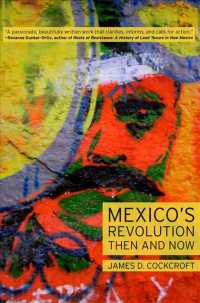Full Description
This groundbreaking handbook offers a contemporary and thorough review of research relating directly to the preparation, induction, and career long professional learning of K-12 science teachers.
Through critical and concise chapters, this volume provides essential insights into science teacher education that range from their learning as individuals to the programs that cultivate their knowledge and practices. Each chapter is a current review of research that depicts the area, and then points to empirically based conclusions or suggestions for science teacher educators or educational researchers. Issues associated with equity are embedded within each chapter. Drawing on the work of over one hundred contributors from across the globe, this handbook has 35 chapters that cover established, emergent, diverse, and pioneering areas of research, including:
Research methods and methodologies in science teacher education, including discussions of the purpose of science teacher education research and equitable perspectives;
Formal and informal teacher education programs that span from early childhood educators to the complexity of preparation, to the role of informal settings such as museums;
Continuous professional learning of science teachers that supports building cultural responsiveness and teacher leadership;
Core topics in science teacher education that focus on teacher knowledge, educative curricula, and working with all students; and
Emerging areas in science teacher education such as STEM education, global education, and identity development.
This comprehensive, in-depth text will be central to the work of science teacher educators, researchers in the field of science education, and all those who work closely with science teachers.
Contents
Section 1: Engaging in Science Teacher Education Research
Section Editor: Julie A. Luft
The Importance of Research in Science Teacher Education
Sibel Erduran and Liam Guilfoyle
The Contribution of Large Educational Surveys to Science Teacher Education Research
Robert H. Tai, Joseph Taylor, Vijay Reddy, and Eric R. Banilower
Qualitatively Conducting Teacher Education Research
Felicia Moore Mensah and Jessica L. Chen
Mixed Methods Research on Science Teacher Education
Gayle A. Buck and Francesca A. Williamson
Towards Justice: Designing for a Rightful Presence as a Lens for Science Teacher Education Research
Angela Calabrese-Barton, Edna Tan, Kathleen Schenkel, and Aerin Benavides
Section 2: Initial Science Teacher Education - Core Areas
Section Editor: Sarah Carrier
Preparing Early Childhood Teachers to Support Young Children's Equitable Science Sensemaking
Carla Zembal-Saul, Christina Siry, Sabela F. Monteira, and Frances Nebus Bose
Well-Started Beginners: Preparing Elementary Teachers for Rigorous, Consequential, Just, and Equitable Science Teaching
Elizabeth A. Davis and Christa Haverly
Research on Secondary Science Teacher Preparation
Todd Campbell, Ron Gray, Xavier Fazio, and Jan van Driel
Understanding the Role of Field Experiences in Preservice Science Teacher Preparation
David Stroupe
Recent Trends in Science Education Research on Mentoring Pre-Service Teachers
Leslie U. Bradbury
Alternative Pathways to Science Teaching: Approaches and Impacts
Elizabeth Edmondson, Alison Dossick, Smadar Donitsa-Schmidt, Yehudit Judy Dori,
Christine Ure, and Christel Balck
Section 3: Initial Teacher Preparation - Situated Aspects
Section Editor: David F. Jackson
Preservice Science Teacher Education Around the Globe: Trends, Challenges, and Future Directions
Hernán Cofré, Claudia Vergara, David Santibáñez, and José Pavez
Partnerships in K-12 Preservice Science Teacher Education
Andrew Gilbert and Linda Hobbs
The Magic of Informal Settings: A Literature Review of Partnerships and Collaborations that Support Preservice Science Teacher Education Across the Globe
Natasha Cooke-Nieves, Jamie Wallace, Preeti Gupta, and Elaine Howes
Discursive Practices in Initial Science Teacher Education
Mercè Izquierdo, Ainoa Marzábal, Cristian Merino, Valeria Cabello, Patricia Moreira, Luigi Cuellar, Virginia Delgado, Franklin Manrique, and Macarena Soto
The Role of Emerging Technologies in Science Teacher Preparation
Gina Childers and Rebecca Hite
Policy in K-12 Science Teacher Preparation: Uniformity and Diversity from International Perspectives
Cheng Liu, Wenyuan Yang, and Enshan Liu
Section 4: Science Teacher Continuing Professional Development
Section Editor: Lauren Madden
The Learning Opportunities of Newly Hired Teachers of Science
Shannon L. Navy, Julie A. Luft, and Audrey Msimanga
Science Teacher Leadership: The Current Landscape and Paths Forward
Brooke A. Whitworth, Julianne A. Wenner, and Dorit Tubin
Professional Development of Science Teachers for Inquiry Instruction
Umesh Ramnarain, Daniel Capps, and Ying-Shao Hsu
A Literature Review of Global Perspectives on the Professional Development of Culturally Responsive Science Teachers
Julie C. Brown, Rose M. Cringle, and Nihat Kotluk
Professional Learning Communities Across Science Teachers' Careers: The Importance of Differentiating Learning
Ron Blonder and Vicki Vescio
Digital Technologies and Professional Learning of Science Teachers: A Technological Pedagogical Content Knowledge (TPACK) Perspective
Seng Chee Tan, Tang Wee Teo, and Chin-Chung Tsai
Section 5: Science Teacher Education -Central Tenets
Section Editor: Soonhye Park
Science Teacher Professional Knowledge and Its Relationship to High-Quality Science Instruction
Vanessa Kind, Soonhye Park, and Kennedy Kam Ho Chan
Indigenous Knowledge in Science Education: Implications for Teacher Education
Josef de Beer, Neal Petersen, and Meshach Ogunniyi
Action research: A Promising Strategy for Science Teacher Education
Allan Feldman, Nadja Belova, Ingo Eilks, Marika Kapanadze, Rachel Mamlok-Naaman,
Franz Rauch, and Mehmet Fatih Taşar
Including All Learners through Science Teacher Education
Michele Hollingsworth Koomen, Sami Kahn, and Teresa Shume
The Role of Teacher Education in Teaching Science to Emergent Bilingual Learners
Edward G. Lyon and Sara Tolbert
Educative Curriculum Materials and Their Role in the Learning of Science Teachers
Melina Furman, Mariana Luzuriaga, Margarita Gomez, and Mauricio Duque
Section 6: Science Teacher Education - Emerging Areas
Section Editor: Rachel Mamlok-Naaman
Learning to Teach Controversial Topics
Michael J. Reiss
Professional Identity as a Framework for Science Teacher Education and Professional Development
Dana Vedder-Weiss
Emotion and Science Teacher Education
Alberto Bellocchi and Arnau Amat
Learning to Teach Science from a Contextualized Stance
Michael Giamellaro, Kassandra L'Heureux, Cory Buxton, Marie-Claude Beaudry,
Jean-Philippe Ayotte-Beaudet, and Talal Alajmi
Learning in and Through Researcher-Teacher Collaboration
Carrie D. Allen, Sara C. Heredia, Eve Manz, and William (Bill) Penuel
Integrated STEM Teacher Education: An Opportunity for Promoting Equity
Erin E. Peters-Burton and Kelly L. Knight







